Cushing Connector Fall 2023

At St. Coletta, a room to move and explore
Thanks to a $20,000 private gift, there’s a new favorite spot at Cushing’s St. Coletta Day School in Braintree. The motor sensory room, which opened this fall, features a range of equipment including a ball pit, swings, a Jungle Jumparoo, tubes and mats, touch-sensitive lights, space-themed fine motor panels, bubble machines, gel floor tiles and more. It is a space where students are encouraged to move, play and explore. Through movement activities, such as climbing, jumping and swinging, students are able to improve their motor planning skills. It also helps with focus and regulation.
“The kids absolutely love it,” said Doug Frazier, director of St. Coletta’s. “They walk by and they just want to go in.”
When the school received the donation, Frazier says staff members came together to discuss some of the greatest needs.
“Instead of upgrading this or that, we thought why not create a new space that could really benefit so many of our students,” he said.
The room had to be prepped with new paint and specialized flooring before the equipment could be set up, and staff members were trained in the room over the summer. The last piece to be delivered and installed is a much-anticipated climbing wall. Frazier says students can access the room whenever they want or need it. Up to four students are allowed in the room at a time, accompanied by a staff member.
Understanding, embracing our responsibility

By Michelle Markowitz
Welcome to this edition of the Cardinal Cushing Connector highlighting the many positive happenings at Cardinal Cushing Centers.
While we have much to celebrate, I would be remiss if I did not mention recent published reports concerning horrific abuse and mistreatment in some residential schools. We are all truly disheartened by these incidents. We are acutely aware of the heart-wrenching decisions of parents and families to place their children in residential environments when they are faced with the reality that they cannot be supported in a home setting. While these incidents may be outliers, they also highlight challenges that residential programs face in supporting these individuals and their families, particularly with staffing.
We welcome the opportunity to take part in a process that updates regulations and enhances transparency. We stand ready to work collaboratively with our regulatory bodies to strengthen the commitment we have to the individuals and families we serve. Please know that we will always do our absolute best to ensure the optimum results for every student and adult entrusted to our care.
We continue to celebrate the myriad of success stories we have at Cushing, several of which are highlighted in this edition. We are especially grateful for those who support our mission, from long-time employees at the end of distinguished careers to volunteers from a corporate partner donating their time and effort.
Thank you for your interest in Cardinal Cushing Centers.
For the Begonis family, a legacy of giving

Trusted donor and valued friend Geraldine (Gerry) Begonis passed away in March of 2022, but her legacy still lives on at Cushing. When Gerry was deciding what to do with her individual retirement account (IRA), she turned to Cardinal Cushing Centers. She set it up so that, starting at age 70½, a portion of her required minimum distribution (RMD) would go directly to Cushing through a qualified charitable distribution (QCD).
The new minimum age for an RMD is 73, however a QCD can be made starting at age 70½. Individuals can donate up to an annual maximum of $100,000 as a QCD. In addition to making a charitable gift, RMDs can also be used to cover living expenses, set up new investments or transfer funds to a loved one.
“I am so pleased that I have found a way to give back annually to an organization whose mission speaks volumes to me,” Gerry said at the time. “Giving to Cushing is a win-win situation. I can make an impact in an area and field that is meaningful to me, while also making a smart financial decision for myself. It was an incredibly easy process from the initial call to the completion of the forms and the electronic transfer of the donation.”
Since her passing, Gerry’s family has continued to contribute annually on her behalf. Gerry had a long-term commitment to Cushing, and her family knew that continued giving is what she would have wanted. Gerry believed in opportunities for all, and thought that people should be seen for what they can do, rather than for what they can’t.
Gerry lived in Braintree at the time of her passing. She was a longtime resident of Weymouth and an educator in the town’s school system, as well as at Fisher College.
Please contact your tax professional to learn how making a qualified charitable distribution from your IRA can benefit you. For more information about including Cardinal Cushing Centers in your plans, contact Laurie Maranian, Director of Development, at lmaranian@cushingcenters.org or 781-829-1247.
Retirees leave their mark on Cushing
For so many long-term employees at Cardinal Cushing Centers, their work is not just a job; it’s what they were meant to do. That rings true for four individuals who collectively served more than 160 years of employment before retiring this year: Nancy Gentile, Lezlie Hodges, Debra McGeoghegan, and Linda Santacroce.
“We are incredibly grateful for their gifts, their advocacy, and their impact to not only our students but to our entire community,” said Cushing President and CEO Michelle Markowitz.
Gentile reflects on nearly 50 years
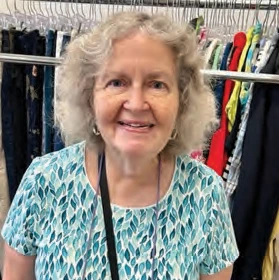
Nancy Gentile, who was employed by Cushing for 38 years, volunteered for 11 years before she was hired. “I was in college at the time, majoring in elementary education and I wanted to switch to special ed,” said Gentile. “I started volunteering in 1974, when they had a summer camp program, and then I would come back for bingo nights and other events like homecoming and graduation and their holiday bazaar.”
Gentile grew up in nearby Halifax and was familiar with Cushing. In her first year out of college, she was substituting at various schools and ended up filling in at Cushing during the Blizzard of ’78. After that, she worked in public schools until 1985, when she was hired by Cushing to teach in the vocational department. “In this environment, everyone was so supportive of each other, and there was really a lot of teamwork,” said Gentile. “It was so rewarding, seeing the progress in the students.”
Gentile worked with young adults, up to age 22, assisting them with career development, employment, and adult transition. She primarily worked with students who were placed in the culinary department, but for the last few years, she had been working with students in the MarketPlace, primarily at the thrift shop, Take 2. “We’d give them certain responsibilities at the sites, but there was a lot of classroom work as well —building social skills and employability skills, budgeting, and practicing interviewing,” she said. “And while they were working, they were learning the importance of things like being on time, working well with others, practicing proper hygiene, and building up stamina. The goal was to prepare them for whatever job they might get.
“Having the MarketPlace now is great because they really have the opportunity to mingle with the public,” said Gentile, who plans to go back to Take 2 as a volunteer in her retirement.”
Hodges was a nighttime fixture
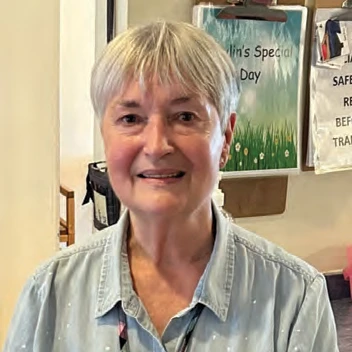
Lezlie Hodges had a 41-year career as a residential life skills instructor, doing overnight shifts in Cushing’s residences. She was introduced to the organization three years prior to being hired, when she would volunteer once a week in the thrift shop.
“My daughter had just gone off to college and I was working in retail, but my day at Cushing was my favorite day of the week,” said Hodges. “When I saw the students, it just stuck with my heart and I wanted to be there.”
Though she has cut back her hours over the years, Hodges says she stayed on well past retirement age because she never wanted to leave. “That’s where it was for me, with the students,” she said. “It was important to help them set themselves up for the future. I’d like to think they might feel one of us on their shoulders as they navigate through life.”
A Hanover resident, Hodges lives less than four miles away — particularly convenient for her set of hours. “We would usually have 13-hour shifts, starting at 8 p.m., getting them ready for bed and then getting them going the next morning for breakfast and school. I never missed work because of snow or any other weather. I always knew they were counting on me, especially since I lived so close.”
McGeoghegan got her start as a child
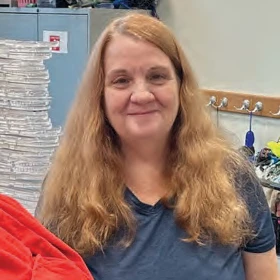
Debra McGeoghegan can lay claim to the longest tenure at Cushing out of this group. She started volunteering at age 12, was hired eight years later, and retired after 47 years. During her youth, she volunteered a few times a week after school, working with girls not much younger than herself – ages 6 to 11.
“We’d help take them out to the playground and then get ready for dinner and bed,” said McGeoghegan, a Rockland resident. “I loved the kids. It was just so rewarding. It was incredible to watch them grow or to see them struggle with something and then accomplish it and be so proud.”
When she was hired by Cushing after high school, McGeoghegan started working in weekend relief. She then moved on to the residential day program, working 1-9 p.m. shifts. She was in residential for 18 years, leaving as a house manager, before she transitioned to vocational training. She helped to start Cushing’s redemption center and then took a position working part-time as a job coach at Cushing, while also working part-time as a community living counselor at the former Cushing Residence, a facility of apartments for low-income seniors.
When the apartment complex was sold, she came back to Cushing full-time as a vocational instructor and manager of the thrift shop — both the former shop and the new MarketPlace shop, Take 2.
“I’ve thoroughly enjoyed and cherished the experiences I have had in each position,” said McGeoghegan. “I still remember coming home from work and telling my friends ‘it was so much fun.’ I loved it. It was just a big family, and I loved my students. As much as I taught them, I learned so many things from them. I was so proud of them — and I still am today. There’s one student who was 16 when I started working with her and she just turned 62, and we still talk once a week.”
McGeoghegan entered retirement with mixed emotions — excitement for the future and sadness for what she’s leaving behind.
“I’ve made lifelong friends of many co-workers, and I will truly miss being a part of this organization as it has been a part of my life for 55 years,” she said.
Santacroce found love, career bliss
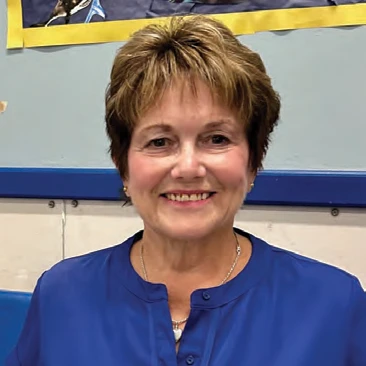
Linda Santacroce spent her 37-year career with Cushing at St. Coletta Day School in Braintree. She was hired as a workshop assistant and also worked in the former convent, preparing meals for the sisters. In 2000, she became St. Coletta’s art instructor. Ten years ago, she also started doing pre-vocational skills training for students ages 14-16.
“In my later teens, I always knew I wanted to work with special-needs children,” said Santacroce. “It’s a hard job, but you do it for the feeling you get when you see a child better themselves and become more independent, and take pride in that. We better ourselves, too, when we do something for someone else. This is what I wanted to do — help them and comfort their parents, knowing they’re in a safe, nurturing environment.”
Santacroce, who lives in Weymouth, met her husband, Nick, while working at Cushing. They have been married for 27 years. He worked at Cushing for 40 years before retiring nine years ago.
“I’m so glad I met Nick,” she said. “He’s the kindest person you’ll ever meet.”
Santacroce has three children, nine grandchildren, and six great-grandchildren. She is looking forward to spending more time with them in retirement, but she knows Cushing will forever hold a special spot in her heart.
“I miss the kids terribly, and I miss the staff,” she said. “I’ve already gone back twice since leaving.”
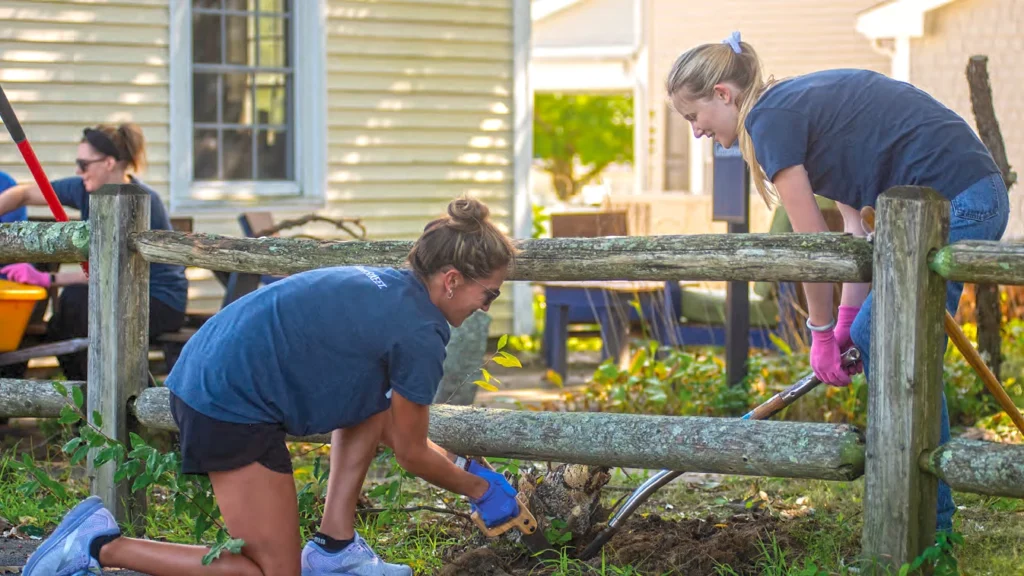
Planting seeds of volunteerism
It takes more than one set of hands to make a garden grow. Fortunately, a plethora of volunteers are stepping up to help the Cushing Greenhouse flourish.
Eleanor Arpino, Cushing’s sustainability coordinator, says the Greenhouse relies on the hard work of corporate and individual volunteers, as well as school groups.
In September, a group from State Street Corporation spent a day at Cushing, clearing invasive weeds and trees and harvesting milkweed seeds to expand space for new planting.
“They did an incredible job,” said Arpino. “We had them clear what we called the jungle — a 5-foot-wide, 30-foot-long section of weeds and overgrowth. We don’t use any chemicals in the garden, so the weeds had really spread. I wish I had taken before-and-after pictures, because the visual transformation was mind-boggling.”
The group, representing the Corporate Functions Business Risk Management team, had a busy and rewarding day.
“We chose Cardinal Cushing Centers because we knew it had an impact on the lives of people with intellectual disabilities,” said Clare Boretti, assistant vice president at State Street. “It gave our team a chance to connect with each other in a different way by weeding and digging in the soil together, instead of being in the office. We were impressed by how organized the Cushing staff was, and enjoyed hearing about all the activities, housing and learning opportunities taking place. We look forward to volunteering again.”
Also in September, a group of students from Norwell High School spent some time at the Greenhouse, planting new garlic bulbs, as well as hydrangeas and perennials donated by Kennedy’s Country Gardens in Scituate and the Downtown Boston Business Improvement District.
At the start of October, students from Archbishop Williams High School helped to plant mums, clean up the recreation department’s ropes course and organize donations at the MarketPlace.
Arpino also expects groups from Chase Bank and Jumbo Capital to volunteer before the end of the calendar year. Jumbo Capital volunteers are scheduled to help with the sale of trees in early December. Groups from J. Jill and Home Depot have also expressed interest in volunteering.
“We find that people really enjoy it when they come in — and we certainly appreciate the help,” said Arpino.
Some groups have offered help in other ways, as well. In the spring, Boy Scout Troop 49B from Kingston built a three-bin composter for the Greenhouse.
Two volunteers, Sheila McCourt and Jennifer Sage, have been coming every Tuesday morning to work in the Greenhouse.
“They’ve been so good,” said Arpino. “I’ve had them help me oversee some of the other volunteer groups that come in.”
All are welcome to visit the Greenhouse to volunteer or to shop for seedlings, fresh flowers, pumpkins and holiday wreaths and trees, depending on the season. The holiday garden sale will take place on Fridays and Saturdays 12-8 p.m. and Sundays 10 a.m. to 5 p.m., Nov. 25 through Dec. 17. Christmas trees, wreaths, fireside baskets and holiday flowering plants will be available.
Gifts that keep on giving
Cardinal Cushing Centers relies on the generosity of its supporters to fund major improvement projects, as well as valuable programming.
Renovations to the auditorium are well underway thanks to $250,000 from the Amelia Peabody Charitable Fund and $75,000 from the Yawkey Foundation. One family contributed $200,000 toward the renovations as part of a $1 million gift. The remaining $800,000 of that gift was designated for stipends for Cushing’s adult services staff.
With the updated space, Cushing will be able to welcome professional and community groups to provide new, engaging experiences for students. This will also benefit members of the community by providing a space to enjoy and view live performances while being more integrated into the Cushing community. The auditorium is also a gathering space for staff meetings and trainings, and the home of a vibrant performing arts program, which includes drama, music, dance, and rhythmics.
Bryce and Kathi Blair of Hingham have contributed $100,000 to fund the auditorium’s new furniture, which will include movable tables and chairs to create a multi-purpose room. Over the years, the Blairs have also made significant gifts to Cushing’s capital campaign and funded the first model classroom at Cushing, equipped with SMART technology.
Paul Sullivan, vice president of Sullivan Tire and Auto Service, has long been a generous supporter of Cushing. His most recent gift of $50,000 paved the way for upgrades to Cushing’s basketball courts, track, and recreation area.
“I’d like to congratulate the Cushing administration and staff for recognizing the need to participate in physical activities that are just so important in helping all of us, in terms of gaining independence and social awareness,” Sullivan said. “Being from a family of 10, I was always encouraged to ‘play ball’ — that will forever ring in my ears — and now it’s ‘play ball’ time at Cushing. It’s clear that Cushing cares about its participants and wants them to have those experiences to look forward to each and every day. Raising children, and especially society’s most vulnerable, is a commitment we can all participate in. Just to see the smiles on the kids’ faces is a great takeaway.”
Other major gifts have included $20,000 for repairs and renovations to the Greenhouse, $800,000 to replace the windows in the Leonard Florence Education Center, and $100,000 to repave the entryway in Hanover. And through a combination of donations, more than $250,000 has been raised to rebuild the Washington Street adult residence.
To help Cushing fund a program and provide greater opportunities for independent living and lifestyles for adult clients, contact Jansi Chandler, Chief Development Officer, at jchandler@cushingcenters.org or 781-829-4611.
About Cushing Centers
Since 1947, Cushing's caring community has been a place where exceptional individuals of all ages and abilities have found possibility, opportunity, and hope, receiving support to achieve independence and meaningful relationships across home, work, school, and leisure.
Stay in the Know!
Join the Cushing Email Newsletter.
